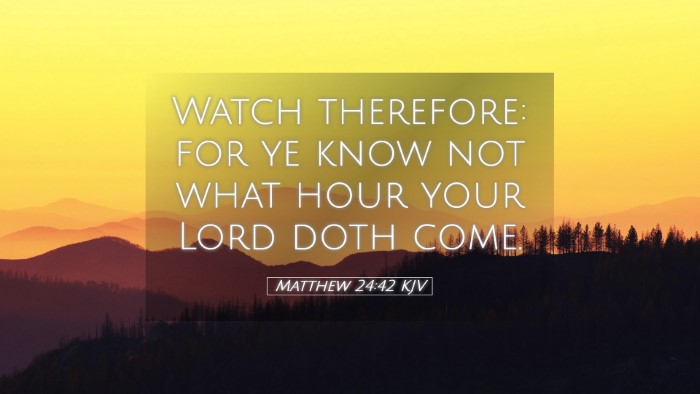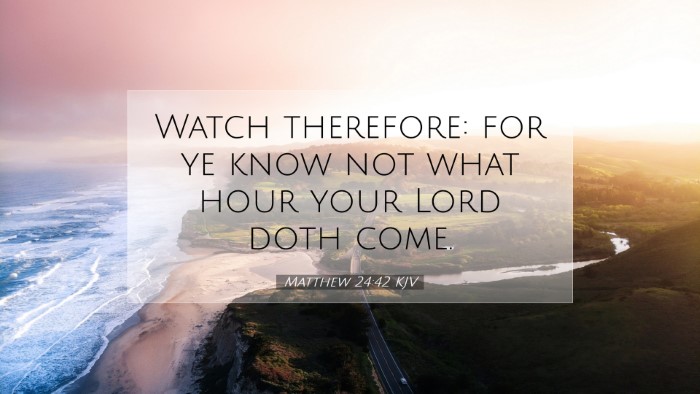Commentary on Matthew 24:42
Verse Text: "Watch therefore: for ye know not what hour your Lord doth come." (Matthew 24:42)
Introduction
Matthew 24:42 is part of Jesus’ Olivet Discourse, a pivotal teaching moment that emphasizes the importance of vigilance and preparedness in the life of a believer. This verse encapsulates the theme of watchfulness that reverberates throughout this chapter and other teachings of Jesus. By examining insights from renowned biblical commentators such as Matthew Henry, Albert Barnes, and Adam Clarke, we can gain a deeper understanding of this text.
Importance of Watchfulness
Matthew Henry emphasizes that the call to "watch" is one of the fundamental duties of Christians. It signifies spiritual alertness and readiness. He writes, “Watching is a great and necessary duty; we must not only be awake ourselves, but help others to watch too.” Being watchful signifies more than just waiting; it embodies a proactive engagement in faith, prayer, and righteous living.
Spiritual Preparedness
Albert Barnes echoes this sentiment by stating that the uncertainty of the hour of Christ's return should spur Christians to greater diligence in their spiritual lives. He articulates, “The Lord will come at an unexpected time, and therefore we must always be ready.” This prepared state, as described by Barnes, involves a life marked by virtue, service to others, and a steadfast reliance on God’s promises.
The Element of Uncertainty
Adam Clarke provides rich theological insight into the uncertainty of the timing of the Lord's return. He notes, “The uncertainty of the time of His coming [...] is a strong motive to vigilance.” This uncertainty serves not to frighten believers, but rather to inspire a constant state of readiness, as they do not know when they will be called to account for their lives.
Historical Context
Clarke also encourages readers to consider the historical context in which Jesus spoke these words. The early church faced intense persecution, leading them to rely heavily on the return of Christ. “In those days of persecution, the imminence of Christ’s return was not just an abstract teaching but a source of hope and strength,” he remarks. This context highlights that watchfulness was not merely a passive waiting but an active and hopeful expectation.
Practical Applications
- Readiness: The call to watch urges believers to live in a state of constant readiness—spiritually, morally, and socially. Henry points out that vigilance involves an ongoing commitment to living out one's faith actively and authentically.
- Awareness of Times: Barnes emphasizes the importance of understanding the times one lives in. Being aware of cultural and spiritual conditions reinforces the call to be vigilant.
- Community Responsibility: As Henry notes, part of the watching includes helping others in the community. Pastors and church leaders are particularly called to guide their congregations towards vigilance.
Theological Significance
Theologically, this verse challenges the idea of complacency. Christians are reminded that true faith is active and engaged rather than passive. As Clarke elaborates, “The essence of faith includes an expectation of God’s action in our lives and a readiness to respond.” This highlights the dynamic relationship between God and the believer, where both parties engage actively in faith practices.
Reflect on Personal Readiness
This verse invites reflection on one's personal state of preparedness. It raises crucial questions about spiritual disciplines, life priorities, and the overall state of one's faith. Matthew Henry encourages believers to ask, “What would I do differently if I knew Christ was returning tomorrow?” This introspection can lead to significant spiritual growth and renewal.
Conclusion
Matthew 24:42 serves as a profound reminder of the importance of watchfulness in the life of every believer. Drawing on the insights from Henry, Barnes, and Clarke, we are encouraged to cultivate a vigilant spirit in anticipation of Christ’s return. This call to readiness is not merely transactional but deeply relational, rooted in love for God and neighbor. Let us strive to embody the watchfulness that brings hope, community, and active engagement in our faith journeys.


